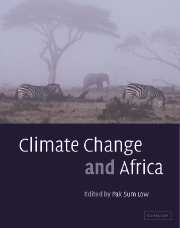Book contents
- Frontmatter
- Contents
- Notes on contributors
- Peer reviewers
- Editor's note
- Foreword
- Foreword
- Foreword
- Foreword
- Preface
- Preface
- Preface
- Preface
- List of abbreviations
- List of SI prefixes
- List of unit abbreviations
- List of chemical formulae
- Part I Science
- Part II Sustainable energy development, mitigation and policy
- Part III Vulnerability and adaptation
- 18 Potential impacts of sea-level rise on populations and agriculture
- 19 Sea-level rise and coastal biodiversity in West Africa: a case study from Ghana
- 20 The impacts of ENSO in Africa
- 21 Climate policy implications of the recent ENSO events in a small island context
- 22 El Niño causes dramatic outbreak of Paederus dermatitis in East Africa
- 23 The role of indigenous plants in household adaptation to climate change: the Kenyan experience
- 24 Requirements for integrated assessment modelling at the regional and national levels in Africa to address climate change
- 25 Climate and disaster risk reduction in Africa
- Part IV Capacity-building
- Part V Lessons from the Montreal Protocol
- Index
21 - Climate policy implications of the recent ENSO events in a small island context
Published online by Cambridge University Press: 10 December 2009
- Frontmatter
- Contents
- Notes on contributors
- Peer reviewers
- Editor's note
- Foreword
- Foreword
- Foreword
- Foreword
- Preface
- Preface
- Preface
- Preface
- List of abbreviations
- List of SI prefixes
- List of unit abbreviations
- List of chemical formulae
- Part I Science
- Part II Sustainable energy development, mitigation and policy
- Part III Vulnerability and adaptation
- 18 Potential impacts of sea-level rise on populations and agriculture
- 19 Sea-level rise and coastal biodiversity in West Africa: a case study from Ghana
- 20 The impacts of ENSO in Africa
- 21 Climate policy implications of the recent ENSO events in a small island context
- 22 El Niño causes dramatic outbreak of Paederus dermatitis in East Africa
- 23 The role of indigenous plants in household adaptation to climate change: the Kenyan experience
- 24 Requirements for integrated assessment modelling at the regional and national levels in Africa to address climate change
- 25 Climate and disaster risk reduction in Africa
- Part IV Capacity-building
- Part V Lessons from the Montreal Protocol
- Index
Summary
Keywords
Climate policy; El Niño; La Niña; ENSO; small island states; vulnerability and adaptation; the Seychelles
Abstarct
El Niño and La Niña are the warm and cold phases of El Niño-Southern Oscillation (ENSO) that develop in the eastern and central equatorial Pacific. The strong El Niño in 1997–1998 was rapidly followed by a strong La Niña in 1998–2000. Both events caused severe economic and human losses in many parts of the world, including small island states. In the Seychelles, the El Niño event brought extreme rainfall causing flooding and landslides; and due to the elevated sea surface temperatures, severe coral bleaching occurred. On the other hand, the La Niña event brought an extended drought, resulting in acute water shortages. Both events caused profound impacts that led to economic and infrastructure losses, especially in the fisheries and tourism sectors, as well as the infrastructure on the coastal areas.
This chapter highlights the vulnerability of small island states to the extreme climatic events caused by ENSO and to the climate change, which is projected to increase the frequency of such extreme climatic events. Without appropriate observing systems and an adaptive policy framework, adaptation to such extreme climate events, which is already an extra burden on those states, will be difficult.
- Type
- Chapter
- Information
- Climate Change and Africa , pp. 231 - 239Publisher: Cambridge University PressPrint publication year: 2005
- 3
- Cited by



